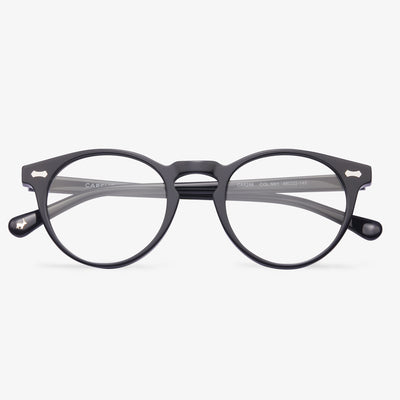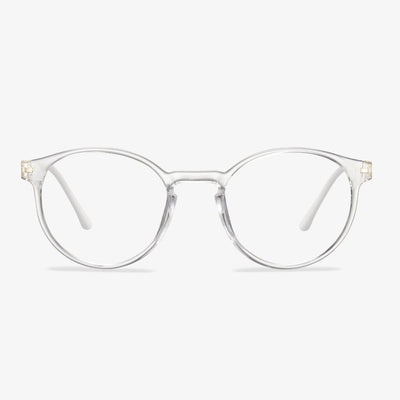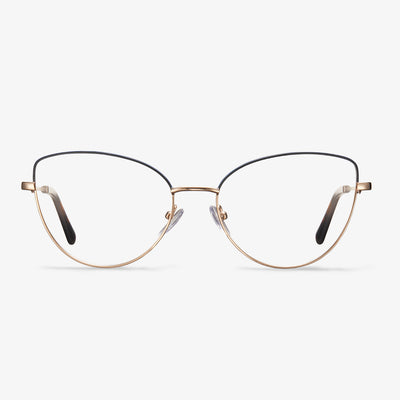Benefits of glasses without nose pads
Glasses without nose pads are mostly used for sheet materials because the sheet material is lighter and not allergic. From the viewpoint of aesthetics and comfort, no nose pads are more suitable. Glasses without nose pads have a relatively small contact area with the bridge of the nose, so it is not easy to have obvious indentations on the bridge of the nose, while glasses with nose pads will have obvious indentations after wearing them for a long time.
In addition to supporting the frame, the nose pad has another function to prevent allergies and avoid discomfort caused by allergies to metals or other materials. Whether it is better to have glasses with nose pads or without nose pads, depends on your personal situation. If your nose is sensitive to weight or the bridge of your nose is lower, you should choose glasses with nose pads. If you are particularly looking for beauty and don't want any marks on your face, then choose glasses without nose pads.
In fact, it is hard to say which one is better between nose pads and no nose pads. The key is to look at personal preference and wearing comfort. Generally speaking, a high nose bridge is suitable for choosing frames without nose pads. It is more suitable to choose the frames with nose pads for people with flat nose bridges in order to prevent the glasses from sliding off and affecting the visual effect.
The birth of progressive lenses
In 1907, British optometrist Owen Aves first proposed the concept of progressive lenses and got the first patent of progressive lenses. In 1910, Henry Orford Gowlland designed and made a similar lens in Canada, but technical limitations prevented it from succeeding. In 1959, Bernard Maitenaz, a French optical and mechanical engineer, developed the first progressive lens, which was successfully put into the commercial market for the first time and became a milestone in the history of world optometry. With the development of science and technology, the design of progressive lenses has been greatly developed.
Replace the nose pad on your glasses
Remove the screws clockwise and use a toothpick to remove the things left of the broken pads so that the new one can be installed. The next step is to fix the nose pad that we just removed from it. Hold the glasses and then the hole for the nose pad is up, then place the nose pad in and press it with your finger. Then you can see that the round hole in the nose pad overlays with the round hole in that part, and at this time, you can turn the screws. When you finally turn it, you usually turn it three times to hold the nose rest in place. Often, the nose pad can be swung back and forth after installation. This is to match the different shapes of our noses.
How To Use Contact Lens Correctly?
It is not recommended to use contact lenses when they are dry. Because when they are dry, even the nursing vacuole is used, the parameters change. It will affect the comfort of wearing, so it is recommended to replace the new lens. After the nursing liquid is used every time, you should cover the lid tightly. Do not touch the mouth of the bottle with your hand. If expired and unused, it should be discarded and replaced with new nursing fluid. As for your discomfort, you should return to the store for inspection.Contact lenses and glasses should be used interchangeably.
About the Glasses Direct
Glasses Direct is an online professional eyewear shopping site based in the UK, with the leading online sales volume in Europe. Over the past five years, its online sales have increased by 50%, and it has had more than a million customers. Since 2004, they have been providing affordable glasses with uncompromising quality and professional service. The frames selected included big brands like Ray-Ban and Oakley and came in a variety of shapes and sizes. Its main goal is to provide a convenient option for people who need corrective glasses.
Cyxus Blue-Light-Blocking Glasses for Kids
So the price you pay for a pair of blue light blocking lenses depends more on the quality and style of the frame than on the effectiveness of the lens. The glasses, which come in a black and pink frame, come with a waterproof case in the shape of a rabbit, a cleaning cloth, and a blue-light flashlight to test the lenses. The brand's boxes come in very cute kids' colors and shape to make it fun. (In addition to the all-black version, there are blue, green, and red versions.)
Try to avoid wearing the following glasses.
If you need to wear glasses while driving, you'll need special glasses when driving at night, because common lenses reflect oncoming lights, which produces a faint glare. This will reduce your visibility. It's OK to wear contact lenses while driving. As you get older, your eyes become more sensitive to glare. Ordinary sunglasses or goggles are only suitable for wearing during the day, driving at night will seriously affect the vision (national standards stipulate that light transmittance of night driving glasses must be greater than75%). Although the all-weather driving glasses can weaken the strong lights, the vision darkens and affects road safety which does not meet the national standards for driving glasses at night. You should choose functional driving glasses that can block strong light, glare and increase the field of vision. This can effectively reduce the glare of the car lights but can filter out the extra harmful light. When worn at night, it can soften the strong lights and make the vision clearer. In this way, the safety of drivers is ensured, the fatigue of eyes is alleviated, and the radiation damage of harmful lights to glasses is prevented.











































